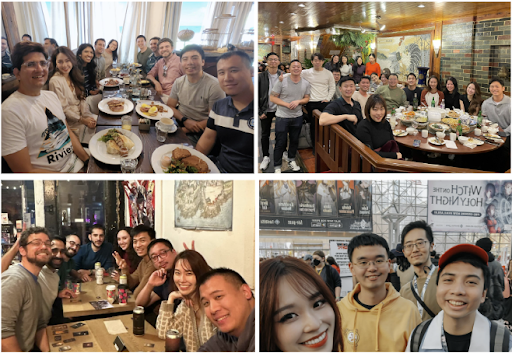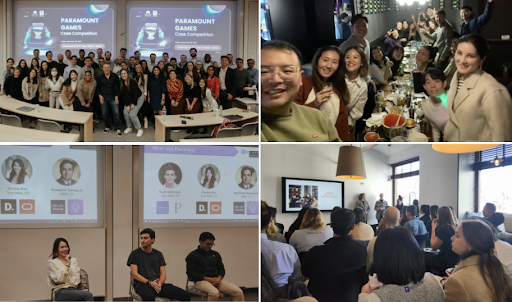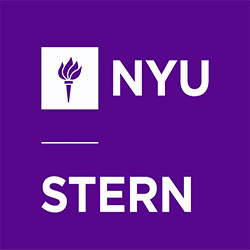 Christy Kim is a MBA candidate at NYU Stern’s Andre Koo Tech MBA program, specializing in Business Analytics and Product Management. Prior to Stern, she worked at Deloitte Consulting, driving large-scale data and analytics transformations for clients across various industries. She additionally brings a background in product marketing, alliances, and tech sales and graduated from Duke University. At Stern, she serves as the VP Tech MBA – Business Analytics Club (BAC), VP Conferences & Flagship Events – Gaming & Esports Management Society (GEMS), AVP Events of Asian Business Society (ABS), and member – Stern Technology Association (STA).
Christy Kim is a MBA candidate at NYU Stern’s Andre Koo Tech MBA program, specializing in Business Analytics and Product Management. Prior to Stern, she worked at Deloitte Consulting, driving large-scale data and analytics transformations for clients across various industries. She additionally brings a background in product marketing, alliances, and tech sales and graduated from Duke University. At Stern, she serves as the VP Tech MBA – Business Analytics Club (BAC), VP Conferences & Flagship Events – Gaming & Esports Management Society (GEMS), AVP Events of Asian Business Society (ABS), and member – Stern Technology Association (STA).
You often hear that the greatest ROI of an MBA is the connections. There is no doubt that our fellow Tech MBA classmates are connections for life, but how do we assimilate into and build relationships with the greater Stern MBA community – especially when 2-year MBAs return in the fall?
The short answer? Get involved in student clubs!
The long answer? Join a club, participate in opportunities to lead your peers, and grow your network while dialing into a business topic you’re passionate about.
Here is a quick ‘Stern MBA Clubs for Dummies’ on how to maximize your club experiences as a Tech MBA student:
PICK A CLUB. ANY CLUB.
As early as orientation, you will have the opportunity (i.e. virtual Club Expo) to explore the 40+ clubs at Stern and express initial interest for follow up/kickoff in the fall:
- Professional clubs (e.g. Stern Technology Association, Business Analytics Club) help you navigate industries and prepare for recruiting
- Affinity, sports, & special interest clubs (e.g. Adventures Club, Asian Business Society) give you an opportunity to meet people with similar interests or explore new areas of interests
- Student Government (SGov) offers leadership opportunities to plan and execute school-wide events; for Tech MBAs, we have a dedicated role (SGov Tech MBA President – shoutout to Reggie Greathouse, our leader!) to serve as the liaison between 2-year MBA and Tech MBA students
With so many amazing club options, it was difficult to not join all! Maximizing involvement over quantity, I decided to join the following 4 clubs (if you have any questions regarding the clubs below, feel free to reach out):
- Business Analytics Club (BAC)
- Gaming & Esports Management Society (GEMS)
- Asian Business Society (ABS)
- Stern Technology Association (STA)
GET INVOLVED: BECOME A MEMBER, ALLY, OR EVEN A LEADER.
In the beginning of the fall semester, clubs will conduct kickoffs where students can learn about the club as well as the membership options (e.g. member, ally) and leadership opportunities across the clubs’ verticals (e.g. Marketing, Finance, Events, Academic). For each vertical, Tech MBAs can run for 2 types of leadership positions:
- VP Position: Intended for 2nd year MBAs – including us, the Focused MBAs! A number of clubs have reserved leadership roles just for Tech MBA students (e.g. I am currently VP Tech MBA for Business Analytics Club).
- AVP Position: Intended to prepare 1st-year MBA students for leadership roles as a VP or President; it is recommended that Tech MBAs serve in this role with another 1st-year MBA student to ensure club continuity and transition into a VP role for the subsequent year.
I found that being a board member has been one of the most rewarding experiences in my MBA journey. It provides the opportunity to intimately collaborate with the 2-year and part-time MBA students as well as the alumni network. Whether it’s spontaneously grabbing dinner together after a board meeting or a scheduled karaoke night, it is an excellent way to develop deeper relationships with those outside of our Tech MBA cohort!

GONE CLUBBING: ATTEND (OR RUN) THE CLUB EVENTS!
In the fall and spring, club events will be in full swing. All events are made available on NYU Stern CampusGroups, which serves as a fantastic platform to learn about the different types of events (e.g. social, academic, alumni) that a club will be hosting or has previously hosted. As a board member, you also get the opportunity to drive the club events! Over this past fall semester, I’ve had a chance to:
- Co-lead the ‘Paramount Games Case Competition’ with fellow Tech MBA classmate, Nick Imbriglia, for Gaming & Esports Management Society (GEMS)
- Plan the ‘Board Dinner & Korean Pocha Night’ as well as ‘End of Semester Rooftop Happy Hour’ for Asian Business Society (ABS)
- Participate as a panelist for ‘Analytics 101’ session (led by fellow Tech MBA classmate, Cody Ipapo) and attend the ‘H&M Office Trek’ for Business Analytics Club (BAC)

CHANCE OF A LIFETIME
In our accelerated 1-year Tech MBA program, the greater ROI potential comes at the expense of time. As I reflect on all the incredible student-driven events from this past fall semester, there is only one thing that I wish I could have done better: having further optimized my time to participate in everything I wanted to do! I am grateful for Stern’s seamless process for Tech MBAs to integrate into the 2-year and part-time MBA community through clubs and organizations. The onus is up to us to take full advantage of the available opportunities in the provided time frame.













